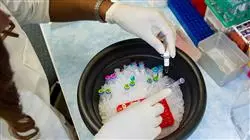University certificate
The world's largest faculty of nursing”
Introduction to the Program
Learning to work in nursing research will give you access to a new vision and a new field of development in the profession”

This Postgraduate diploma offers an immersion into the world of research, starting with the basic concepts, differentiating between basic and health research, definitions and concepts according to the different health and non-health organizations at public and private, national and international levels.
It is also important to study its impact and importance in the world of science for its advancement. A historical review of the evolution of research and more specifically in nursing, its relationship with Epidemiology. The study of Epidemiology is important, since it is the scientific discipline that deals with the study of the spread of diseases, health problems and reasons for their occurrence.
To know beyond the quantifiable and tangible, the reason why individuals act the way they do or when an event bursts in a way that can lead to changes in the perception of things, qualitative research enters the scene, which allows us to know the meaning of what happens to people. Qualitative research in Health Sciences is based on what people and communities feel, perceive and the meaning they give to health processes and disease, all of this as perceived by people and not from the perspective of the researcher, who must abstract their own beliefs, perspectives and predispositions. It seeks to know people in their context, getting to know what they feel in order to understand their vision of things. Therefore, the objective of qualitative research is not to measure the extent of phenomena, but the description of realities for individuals and communities, through the use of the inductive method. The object of the research being the perceptions, feelings and opinions of the subjects under study.
Quantitative research, on the other hand, tries to determine the strength of association or correlation between variables, the generalization and objectification of the results through a sample to make inferences about the population the sample comes from. After studying the association or correlation, it aims, in turn, to make causal inferences to explain why things do or do not happen in a certain way.
In conclusion, the importance of evidence-based practice for the profession is highlighted, so nursing care is determined by solid research results and not according to clinical or traditional predilections.
A complete process for professional growth that will allow you to include among your capabilities the skills of a trained researcher"
The Postgraduate diploma in Research in Nursing Sciences: Qualitative and Quantitative Health Research offers the characteristics of a high-level scientific, teaching and technological course. These are some of its most notable features:
- The latest technology in online teaching software
- A highly visual teaching system, supported by graphic and schematic contents that are easy to assimilate and understand
- Practical cases presented by practising experts
- State-of-the-art interactive video systems
- Teaching supported by telepractice
- Continuous updating and recycling systems
- Autonomous learning: full compatibility with other occupations
- Practical exercises for self-evaluation and learning verification
- Support groups and educational synergies: questions to the expert, debate and knowledge forums
- Communication with the teacher and individual reflection work
- Availability of content from any device, fixed or portable, with an Internet connection
- Supplementary documentation databases are permanently available, even after the program
A unique opportunity to gain access to the most interesting databases and the most powerful educational community in the online teaching market”
The teaching staff includes professionals from the engineering Nurses, who bring their experience to this specialization program, as well as renowned specialists from leading societies and prestigious universities.
The multimedia content, developed with the latest educational technology, will provide the professional with situated and contextual learning, i.e., a simulated environment that will provide an immersive training experience designed to train for real-life situations.
This program is designed around Problem-Based Learning, where the nurse must try to solve the different professional practice situations that arise during the course. For this purpose, students will be assisted by an innovative interactive video system created by renowned and experienced experts in Clinical Nutrition Pediatrics with extensive experience.
Increase your confidence in decision making by updating your knowledge through this program"

Add to your CV the ability to participate in the area of research and position yourself as a competitive and interesting professional for any company"
Why study at TECH?
TECH is the world’s largest online university. With an impressive catalog of more than 14,000 university programs available in 11 languages, it is positioned as a leader in employability, with a 99% job placement rate. In addition, it relies on an enormous faculty of more than 6,000 professors of the highest international renown.

Study at the world's largest online university and guarantee your professional success. The future starts at TECH”
The world’s best online university according to FORBES
The prestigious Forbes magazine, specialized in business and finance, has highlighted TECH as “the world's best online university” This is what they have recently stated in an article in their digital edition in which they echo the success story of this institution, “thanks to the academic offer it provides, the selection of its teaching staff, and an innovative learning method aimed at educating the professionals of the future”
A revolutionary study method, a cutting-edge faculty and a practical focus: the key to TECH's success.
The most complete study plans on the university scene
TECH offers the most complete study plans on the university scene, with syllabuses that cover fundamental concepts and, at the same time, the main scientific advances in their specific scientific areas. In addition, these programs are continuously being updated to guarantee students the academic vanguard and the most in-demand professional skills. In this way, the university's qualifications provide its graduates with a significant advantage to propel their careers to success.
TECH offers the most comprehensive and intensive study plans on the current university scene.
A world-class teaching staff
TECH's teaching staff is made up of more than 6,000 professors with the highest international recognition. Professors, researchers and top executives of multinational companies, including Isaiah Covington, performance coach of the Boston Celtics; Magda Romanska, principal investigator at Harvard MetaLAB; Ignacio Wistumba, chairman of the department of translational molecular pathology at MD Anderson Cancer Center; and D.W. Pine, creative director of TIME magazine, among others.
Internationally renowned experts, specialized in different branches of Health, Technology, Communication and Business, form part of the TECH faculty.
A unique learning method
TECH is the first university to use Relearning in all its programs. It is the best online learning methodology, accredited with international teaching quality certifications, provided by prestigious educational agencies. In addition, this disruptive educational model is complemented with the “Case Method”, thereby setting up a unique online teaching strategy. Innovative teaching resources are also implemented, including detailed videos, infographics and interactive summaries.
TECH combines Relearning and the Case Method in all its university programs to guarantee excellent theoretical and practical learning, studying whenever and wherever you want.
The world's largest online university
TECH is the world’s largest online university. We are the largest educational institution, with the best and widest online educational catalog, one hundred percent online and covering the vast majority of areas of knowledge. We offer a large selection of our own degrees and accredited online undergraduate and postgraduate degrees. In total, more than 14,000 university degrees, in eleven different languages, make us the largest educational largest in the world.
TECH has the world's most extensive catalog of academic and official programs, available in more than 11 languages.
Google Premier Partner
The American technology giant has awarded TECH the Google Google Premier Partner badge. This award, which is only available to 3% of the world's companies, highlights the efficient, flexible and tailored experience that this university provides to students. The recognition as a Google Premier Partner not only accredits the maximum rigor, performance and investment in TECH's digital infrastructures, but also places this university as one of the world's leading technology companies.
Google has positioned TECH in the top 3% of the world's most important technology companies by awarding it its Google Premier Partner badge.
The official online university of the NBA
TECH is the official online university of the NBA. Thanks to our agreement with the biggest league in basketball, we offer our students exclusive university programs, as well as a wide variety of educational resources focused on the business of the league and other areas of the sports industry. Each program is made up of a uniquely designed syllabus and features exceptional guest hosts: professionals with a distinguished sports background who will offer their expertise on the most relevant topics.
TECH has been selected by the NBA, the world's top basketball league, as its official online university.
The top-rated university by its students
Students have positioned TECH as the world's top-rated university on the main review websites, with a highest rating of 4.9 out of 5, obtained from more than 1,000 reviews. These results consolidate TECH as the benchmark university institution at an international level, reflecting the excellence and positive impact of its educational model.” reflecting the excellence and positive impact of its educational model.”
TECH is the world’s top-rated university by its students.
Leaders in employability
TECH has managed to become the leading university in employability. 99% of its students obtain jobs in the academic field they have studied, within one year of completing any of the university's programs. A similar number achieve immediate career enhancement. All this thanks to a study methodology that bases its effectiveness on the acquisition of practical skills, which are absolutely necessary for professional development.
99% of TECH graduates find a job within a year of completing their studies.
Postgraduate Diploma in Nursing Science Research: Qualitative and Quantitative Health Research.
If you are a nursing professional committed to continuous improvement and excellence in healthcare, TECH Global University's Postgraduate Diploma in Nursing Science Research is the perfect opportunity to develop your qualitative and quantitative research skills. Through our 6-month online classes, you will become an expert in the field of healthcare research. Here, we focus on providing cutting-edge academic programs that are tailored to the needs of healthcare professionals. Our Postgraduate Diploma in Nursing Science Research is delivered online, allowing you to access classes from anywhere and at a time that best suits your professional commitments. During the program, you will acquire the knowledge and skills necessary to conduct high-quality research in the Nursing field.
Master qualitative and quantitative health research with TECH.
You will have a highly trained faculty of experts in Nursing science research. Through interactive classes, case study analysis and hands-on activities, you will develop skills to design and conduct research, analyze data and communicate results effectively. At the end of the program, you will be able to design and conduct qualitative and quantitative health research, applying the highest standards of quality and ethics. You will be prepared to contribute to the advancement of Nursing and improve clinical practice through evidence-based research. Don't miss the opportunity to become an expert in Nursing Science Research. Enroll today and advance your career.







